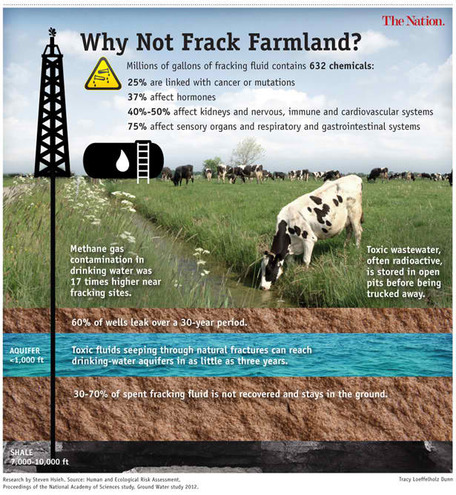
On December 17th, Elizabeth Royte, published an article in The Nation entitled, "What the Frack is in Our Food?" It pointed out the obvious, or perhaps not so obvious...the action of injecting high-powered chemicals into the earth creates a negative reaction that ripples well past the water and people it directly impacts but one that extends throughout the food chain. If you didn't think fracking affects you because it isn't in your backyard (yet), look no further than the food on your plate (queue the Pyscho movie tune, ehehehehe).
The national conversation on natural gas is dominated by the energy independence it can provide the United States. It's like an ostrich with its head in the sand. If it can't see the water it is contaminating, the environmental degradation it is causing and the people and livestock it is making sick and killing, then it is happening. Well, its happening. We say we are addicted to oil & gas, but we have to remember that addiction kills.
There are conflicting reports whether the Volatile Organic Compounds found in fracking fluids such as benzene can accumulate in animals and plants. The reason so little is known is because not enough research has been completed to evaluate the long term effects of these chemicals and how they move through the food chain. But there is definitely enough evidence by the number of illnesses diagnosed in the people who drink the water and inhale the air around fracking wells as well as the number of dead cows and farm animals living in close proximity.
In the article, Elizabet reported, "The World Wildlife Fund identified 632 chemicals used in natural-gas production. More than 75 percent of them, could affect sensory organs and the respiratory and gastrointestinal systems; 40 to 50 percent have potential impacts on the kidneys and on the nervous, immune and cardiovascular systems; 37 percent act on the hormone system; and 25 percent are linked with cancer or mutations."
If we want to believe that these chemicals aren't working their way up the food chain, then we might as well stick our head back in the sand.

 RSS Feed
RSS Feed
